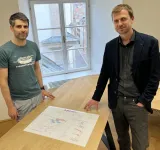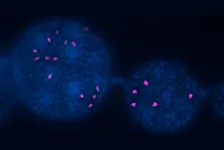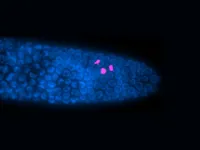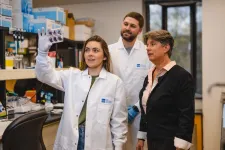(Press-News.org) Today's computers are based on microprocessors that execute so-called gates. A gate can, for example, be an AND operation, i.e. an operation that adds two bits. These gates, and thus computers, are irreversible. That is, algorithms cannot simply run backwards. “If you take the multiplication 2*2=4, you cannot simply run this operation in reverse, because 4 could be 2*2, but likewise 1*4 or 4*1,” explains Wolfgang Lechner, professor of theoretical physics at the University of Innsbruck. If this were possible, however, it would be feasible to factorize large numbers, i.e. divide them into their factors, which is an important pillar of cryptography.
Martin Lanthaler, Ben Niehoff and Wolfgang Lechner from the Department of Theoretical Physics at the University of Innsbruck and the quantum spin-off ParityQC have now developed exactly this inversion of algorithms with the help of quantum computers. The starting point is a classical logic circuit, which multiplies two numbers. If two integers are entered as the input value, the circuit returns their product. Such a circuit is built from irreversible operations. “However, the logic of the circuit can be encoded within ground states of a quantum system,” explains Martin Lanthaler from Wolfgang Lechner's team. “Thus, both multiplication and factorization can be understood as ground-state problems and solved using quantum optimization methods.”
Superposition of all possible results
„The core of our work is the encoding of the basic building blocks of the multiplier circuit, specifically AND gates, half and full adders with the parity architecture as the ground state problem on an ensemble of interacting spins,” says Martin Lanthaler. The coding allows the entire circuit to be built from repeating subsystems that can be arranged on a two-dimensional grid. By stringing several of these subsystems together, larger problem instances can be realized. Instead of the classical brute force method, where all possible factors are tested, quantum methods can speed up the search process: To find the ground state, and thus solve an optimization problem, it is not necessary to search the whole energy landscape, but deeper valleys can be reached by "tunneling".
The current research work provides a blueprint for a new type of quantum computer to solve the factorization problem, which is a cornerstone of modern cryptography. This blueprint is based on the parity architecture developed at the University of Innsbruck and can be implemented on all current quantum computing platforms.
The results were recently published in Nature Communications Physics. Financial support for the research was provided by the Austrian Science Fund FWF, the European Union and the Austrian Research Promotion Agency FFG, among others.
Publication: Scalable set of reversible parity gates for integer factorization. Martin Lanthaler, Benjamin E. Niehoff & Wolfgang Lechner. Nature Communications Physics 6, 73 (2023) DOI: https://doi.org/10.1038/s42005-023-01191-3
END
Quantum computer in reverse gear
Reversible logic gates designed for large scale integer factorization
2023-05-04
ELSE PRESS RELEASES FROM THIS DATE:
Seizure discoveries advance efforts to develop better treatments
2023-05-04
New University of Virginia School of Medicine insights into how the brain responds to seizures could facilitate the development of much-needed treatments for the third of patients who don’t respond to existing options.
The research, from the labs of UVA’s Ukpong B. Eyo, PhD, and Edward Perez-Reyes, PhD, suggests that immune cells called microglia play important, beneficial roles in controlling various types of seizures. Prior research had left scientists uncertain whether these cells were helpful or harmful during the brain’s ...
Taylor & Francis set to open over 50 book titles with Knowledge Unlatched
2023-05-04
Taylor & Francis is delighted to announce the results of Knowledge Unlatched (KU) 2023, with support pledged to convert over 50 book titles to open access (OA). Titles to benefit from this support cover a broad range of humanities and social science disciplines as well as key topic areas, including climate change, global health, and gender studies.
Under the KU crowdfunding model, research libraries around the world unite to support the publication costs of new eBooks and enable access for all to important new research. Since 2016, when Taylor & Francis’ partnership with Knowledge Unlatched began, over 100 books have been published OA at no cost ...
Obesity as a risk factor for colorectal cancer underestimated so far
2023-05-04
Obesity is a known risk factor for colorectal cancer. Scientists at the German Cancer Research Center (DKFZ) have now shown that this association has probably been significantly underestimated so far. The reason: many people unintentionally lose weight in the years before a colorectal cancer diagnosis. If studies only consider body weight at the time of diagnosis, this obscures the actual relationship between obesity and colorectal cancer risk. In addition, the current study shows that unintentional weight loss may be an early indicator of colorectal ...
Happy worms have healthy eggs
2023-05-04
Worms might not be depressed, per se. But that doesn’t mean they can’t benefit from antidepressants.
In a new study, Northwestern University researchers exposed roundworms (a well-established model organism in biological research) to selective serotonin reuptake inhibitors (SSRIs), a class of drugs used for treating depression and anxiety. Surprisingly, this treatment improved the quality of aging females’ egg cells.
Not only did exposure to SSRIs decrease embryonic death by more than twofold, it also decreased chromosomal abnormalities in surviving offspring by more than twofold. Under the microscope, ...
New guidance to help diagnose hoarding disorder
2023-05-04
Experts from Anglia Ruskin University (ARU) have published new guidance to help doctors correctly diagnose hoarding disorder.
Hoarding disorder affects around 2% of the population but remains a largely misunderstood mental health condition. It was only added to the International Classification of Diseases in 2019, having previously been classified under Obsessive Compulsive Disorder (OCD).
Published in the British Journal of General Practice, the new guidance was written by Dr Sharon Morein and Dr Sanjiv Ahluwalia of Anglia Ruskin University (ARU) in Cambridge, England, to help health professionals spot the signs of hoarding disorder and intervene.
ARU experts have also organised a free ...
GlyNAC supplementation improves cognitive decline and brain health in aging
2023-05-04
As people get older, they aspire to live healthy lives as free as possible from the natural decline of cognitive abilities that occurs with aging. At Baylor College of Medicine, researchers have been studying the biological underpinnings of age-associated cognitive decline and developing nutritional strategies to promote healthy brain aging.
They report today in the journal Antioxidants that supplementing GlyNAC – a combination of glycine and N-acetylcysteine as precursors of the natural antioxidant glutathione – improved or reversed age-associated cognitive decline in old mice and improved ...
Three NYU faculty elected to the National Academy of Sciences
2023-05-04
Three New York University faculty have been elected to the National Academy of Sciences: Moses Chao, a professor at NYU Grossman School of Medicine; Glennys Farrar, a professor in NYU’s Department of Physics; and Subhash Khot, a professor in NYU’s Courant Institute of Mathematical Sciences. This year’s election of 120 new members and 23 international members were chosen “in recognition of their distinguished and continuing achievements in original research,” the academy announced.
Moses Chau, a professor of cell biology, psychiatry, and neuroscience and physiology and part of ...
Criteria for selecting who can enroll in multiple myeloma clinical trials may exclude patients from racial and ethnic minorities
2023-05-04
(WASHINGTON, May 4, 2023) – Numerous studies have shown that people from racial and ethnic minority groups are underrepresented in clinical trials of new medical treatments for multiple myeloma. A study published today in Blood suggests that, for clinical trials of new treatments for multiple myeloma (a type of blood cancer), one reason for this underrepresentation may be that the parameters set to determine who can – and cannot – enroll in trials disproportionately exclude minority patients.
“Our ...
Wistar scientists discover innate tumor suppression mechanism
2023-05-04
PHILADELPHIA — (MAY 4, 2023) — The p53 gene is one of the most important in the human genome: the only role of the p53 protein that this gene encodes is to sense when a tumor is forming and to kill it. While the gene was discovered more than four decades ago, researchers have so far been unsuccessful at determining exactly how it works. Now, in a recent study published in Cancer Discovery, a journal of the American Association for Cancer Research, researchers at The Wistar Institute have uncovered a key mechanism ...
Wind energy from a 3D printer
2023-05-04
A pilot project for energy self-sufficient schools is now starting in the County of Friesland, Northern Germany, in which school buildings will be equipped with vertical-axis wind turbines. This will be facilitated by a research group led by Professor Uygun from Constructor University. This group is studying and developing vertical wind turbines, which will be produced in its own 3D printer on the campus in Bremen and will be tested in practice within this project. This creates a fully functional test field that provides important data and experience for technology transfer.
In the current energy ...
LAST 30 PRESS RELEASES:
A promising potential therapeutic strategy for Rett syndrome
How time changes impact public sentiment in the U.S.
Analysis of charred food in pot reveals that prehistoric Europeans had surprisingly complex cuisines
As a whole, LGB+ workers in the NHS do not experience pay gaps compared to their heterosexual colleagues
How cocaine rewires the brain to drive relapse
Mosquito monitoring through sound - implications for AI species recognition
UCLA researchers engineer CAR-T cells to target hard-to-treat solid tumors
New study reveals asynchronous land–ocean responses to ancient ocean anoxia
Ctenophore research points to earlier origins of brain-like structures
Tibet ASγ experiment sheds new light on cosmic rays acceleration and propagation in Milky Way
AI-based liquid biopsy may detect liver fibrosis, cirrhosis and chronic disease signals
Hope for Rett syndrome: New research may unlock treatment pathway for rare disorder with no cure
How some skills become second nature
SFU study sheds light on clotting risks for female astronauts
UC Irvine chemists shed light on how age-related cataracts may begin
Machine learning reveals Raman signatures of liquid-like ion conduction in solid electrolytes
Children’s Hospital of Philadelphia researchers emphasize benefits and risks of generative AI at different stages of childhood development
Why conversation is more like a dance than an exchange of words
With Evo 2, AI can model and design the genetic code for all domains of life
Discovery of why only some early tumors survive could help catch and treat cancer at very earliest stages
Study reveals how gut bacteria and diet can reprogram fat to burn more energy
Mayo Clinic researchers link Parkinson's-related protein to faster Alzheimer's progression in women
Trends in metabolic and bariatric surgery use during the GLP-1 receptor agonist era
Loneliness, anxiety symptoms, depressive symptoms, and suicidal ideation in the all of us dataset
A decision-support system to personalize antidepressant treatment in major depressive disorder
Thunderstorms don’t just appear out of thin air - scientists' key finding to improve forecasting
Automated CT scan analysis could fast-track clinical assessments
New UNC Charlotte study reveals how just three molecules can launch gene-silencing condensates, organizing the epigenome and controlling stem cell differentiation
Oldest known bony fish fossils uncover early vertebrate evolution
High‑performance all‑solid‑state magnesium-air rechargeable battery enabled by metal-free nanoporous graphene
[Press-News.org] Quantum computer in reverse gearReversible logic gates designed for large scale integer factorization




